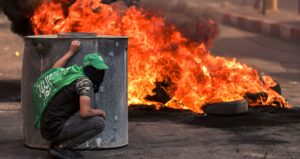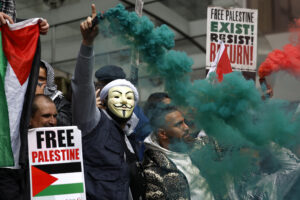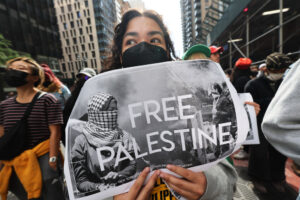It is characteristic of France’s self-absorption that what started as a national sense of outrage at the latest Islamist killing on our soil soon evolved into a bitter scuffle between present and past tough-talking Home Secretaries. Last Friday, Dominique Bernard, a 57-year-old French literature teacher at a state Lycée in Arras, was stabbed to death by a 20-year-old Chechen former pupil, Mohammed Mogouchkov, shouting “Allahu Akbar” as Bernard tried to prevent him from entering the school’s main building. Three years almost to the day, it felt like a terrible repetition of the killing and beheading of another teacher, Samuel Paty, in a west Paris suburb.
That had shocked the country to its core — long known as the Republic’s Hussars, teachers had been explicitly tasked to foster Republican values with the advent of universal public education. Bureaucratic spinelessness and police inefficiency ensured not much has been achieved since, a fact papered over by grandiose talk about “our values”.
Then, as now, the Ministre de l’Intérieur was Gérald Darmanin, who for the last week has been engaged in a slanging match with one of his predecessors, the Socialist Manuel Valls, each accusing the other of weakness in front of the Islamist threat. Both come from immigrant families and both are a strikingly similar type, performative hard men who vow they will protect the country. Each has been trying to outdo, or rather out-talk, the other on law and order, especially terrorism and immigration — and both are failing.
Darmanin, once a Sarkozy boy who during the 2017 presidential campaign tore into Emmanuel Macron as a “bobo-populist” and “sheer poison”, nevertheless agitated for a job in his cabinet, which he got as Minister for State Finances. In the second Macron term, he got his dream promotion to Interior, and began a well-publicised anti-terrorism drive. He closed militant mosques, announced the expulsion from France of 231 “radicalised foreigners singled out by the security services”, and in general broadcast an image of proper police work. How effective that was is unclear (by the end of 2020, only 48 of those on his list had actually left France).
For instance Paty’s killer, Abdoullakh Anzorov, whose sister had joined Isis in Syria, was enjoying refugee status and a 10-year residency permit in France when he slaughtered the teacher, who’d been pointed out to him by his own pupils. Anzorov and his family, who hold Russian passports, had been denied asylum twice since 2008, and were almost expelled from France in 2014. But when they refused to board a plane, a number of NGOs and the French Communist Party raised enough of a political outcry over the family’s apparent “good integration” into French society that the then-Interior Minister Valls countermanded the expulsion order. It’s an error that his successor Darmanin has been at some pains to recall in their recent exchanges.
Darmanin’s presidential ambitions are so blatant that he’s usually described as having “des dents qui rayent le parquet” (“teeth so long they scratch the floor”). This, unsurprisingly, displeases Macron, and explains why he has foregrounded his new Education Minister, Gabriel Attal. He’s an old associate of the President and the ideal son-in-law — so much so that his colleagues style him as having “des dents si longues qu’elles rayent le parquet de l’appartement du dessous” (“teeth so long they scratch the floor of the flat below”). Since Bernard’s murder, most concrete announcements on law and order have been made by Attal, who has requested security in each school and announced that 1,000 supervisors would be posted at college entrances.
But, like the police, schoolmasters and supervisors have seen their numbers plummet in recent years, and for the same reasons: growing insecurity due to a fractious “sensitive” population, and bad pay. Attal hasn’t said where he would find new troops. What amounts to political manoeuvring therefore comes across as nothing more than inglorious and petty. But it is also reassuringly familiar, as is the state incompetence it reflects. For at least three decades, the French have been complaining of what they see as the dereliction of the once-super-efficient French bureaucracy: in public services, unkept promises, and a shrinking of our self-image as reflected by the diminishing French footprint in world affairs. The violence in Israel last week was, though more horrific, as much a reminder of our problems as a distraction.
Antisemitism itself has already been re-imported into France by radical Islam, but for years it was difficult even to name it: it did not belong to the Républicain national narrative. The national integrationist, secularist, and colour-blind model — long successful, now under attack simultaneously from progressive identitarians and violent religious fanaticism — could not have failed. Those who denounced the inroads of Islamists in schools were dismissed as extremists. As early as 2002, authors such as George Bensoussan, Barbara Lefebvre, Emmanuel Brenner and later Paul-François Paoli documented the inroads made into the French school system by intolerant extremists — building on a damning 2004 report commissioned by the Education Ministry — which was never followed by any kind of effective action.
Last Friday, as Bernard tried to stop Mogouchkov, the killer shouted: “Are you a history teacher?” Throughout the country, it’s history classes that are most disrupted, often violently, as pupils deny the lessons of their teachers and their textbooks, usually but not exclusively on the history of the Holocaust. Increasingly, some teachers skip those lessons, feeling they’re getting no support from school or education authorities. Instead, they’re likely to get bad professional ratings from school inspectors who tell them they’re “not able to control the students”. Recent polls show that 80% of French teachers have been at one time or another “scared” by their disruptive, sometimes threatening pupils.
Yet while the French have protested their unity ever since the country started being targeted, there has also been a great deal of self-censorship from the top down. In the days of the Isis crimes, even naming Islamism was criticised as “stigmatisation” and, of course, “Islamophobia”. One million of us took to the streets of Paris after the Charlie Hebdo murders and there have been countless “white marches” to leave white roses and offerings at the sites of successive tragedies: for instance, at the Bataclan theatre where 160 young concertgoers were mown down by Islamist terrorists, just like the desert-ravers in the Negev last week.
In fact, when the worst of the Hamas attacks become known last week, French Jews were shocked but unsurprised. The killing of Jewish children, torture of young people, and beating to death of old ladies had all happened here. They recall the kidnapping, weeks-long torture and murder of a young estate agent, Ilan Halimi in 2006; the shooting of Jewish children in a Toulouse Jewish school in 2012; the murders of two elderly Jewish women, Sarah Halimi in 2017, and Mireille Knoll in 2018, by Muslim neighbours.
Yet in accordance with the well-meaning Républicain narrative, countless threats against Jewish buildings and Jews in the streets were for years discounted by police and judges as the acts of “unbalanced lone wolves”. It took the Charlie Hebdo and Hypercasher murders of 2015 for officials to acknowledge the resurgence of antisemitism in France; and many felt it was done grudgingly. Yet the perpetrators were all radicalised Muslims. The pogrom had happened gradually, then suddenly — and massively.
While one portion of the population grieved, there was never a shortage of useful idiots to excuse each successive rampage. The latest have been drawn from the Left-wing Mélenchonista MPs who, regarding the Hamas attacks, will not let the “T” word sully their lips: Danièle Obono (“Hamas is a Résistance movement, not a terrorist one”); Mathilde Panot (“Hamas is the armed branch of the Gaza Palestinian movement”); and of course Mélenchon himself. So far, so Owen Jones. They are wilfully blind to the fact that France has been especially targeted by Islamists for her secular tradition, which their supporters (and Muslim brotherhood community organisers in the banlieues) relentlessly attack.
For years, the foundational French principle of Laïcité has been intentionally misrepresented. All it means is that the Republic guarantees the neutrality of the public space. Any believers are free to practice their religion as a private affair as long as they respect the law (polygamy, for instance, is forbidden); none are entitled to request a change in state services or in public behaviour. Activist policy, however, is to seize on Laïcité whenever they make their regular accusations of Islamophobia — from attacking anti-headscarf laws in schools to taking up, as a cause célèbre, the death of an asthmatic drug dealer known for having raped a cellmate in prison. (His case is used as proof that the French police routinely kill people, despite the fact that there were 39 “deaths related to any police intervention” in France last year, compared to 1,097 shooting deaths by the police in the US). The bitter irony of such double standards may one day help us French feel a bit more for Israel, a nation regularly held to higher standards than its attackers.
Instead, all that remains is that the broken promise that radical Islam would be stopped — repeated by Emmanuel Macron in Arras last Friday — and the knowledge across France that nothing has been done. From car torching to drug dealing in the streets, to open support for terrorists in the banlieues, the police are a study in flailing helplessness. No wonder its successive ministers are finding it harder to build popularity.
In the face of this inaction, 70,000 French Jews have left France for good in the past 20 years. Among the more privileged of French citizens, those who live in the centre of big cities, there is no common resolve, or capacity to fight back together: the political analyst Jérôme Fourquet, in his essay “L’Archipel français”, describes the mixture of officious self-flagellation, Leftist pieties and atomised, pick-your-own social pact that constitutes this archipelago of French society. Of course, Michel Houellebecq had seen it long before him. Almost nothing binds us any longer. And the young, nearly unknown mandarin first elected president in 2017 to bridge the nation’s division seems to have exacerbated them instead, through his combination of political inexperience and narcissistic hubris.
Last Friday afternoon, hours after Dominique Bernard’s assassination, with the bloodstains still visible on the steps of the school, Emmanuel Macron showed up at Lycée Gambetta in Arras. Alongside Darmanin and a small group of elected officials, he came to speak with the school’s principal, other teachers and local parents. The local MP, Sebastien Chenu, also the Rassemblement National Vice-President of the House, thanked him for visiting his constituents so promptly, then gave voice to the feelings of many of those around him. “I have to say, Monsieur le Président, that the French people expect strong action. Words cannot stop terrorism.”
Witnesses were flabbergasted to see Macron utterly lose his rag. “Show some decency! Mind your own business! This is neither the time nor the place!” Members of the delegation said afterwards they’d never see the president so angry. “I felt I had to say this,” Chenu later said. “I simply encouraged him to act. I wasn’t lecturing him. He didn’t take it well. His reaction was disturbing: he seemed offended because he felt he didn’t have the upper hand, because I was pressing him… He’s always had trouble coming out clearly on Islamism and immigration.”
The scene was described in Le Point: Macron’s people no doubt felt it was damaging enough to leak a counter-narrative that appeared this week in Le Canard Enchaîné, France’s answer to Private Eye. A short item claims Macron had been angered by Chenu allegedly saying “We wouldn’t be in such a situation with Marine [Le Pen as President]”. Except that no witness to the scene heard the phrase, unlike the one quoted by Mathilde Siraud, the Le Point reporter. (Chenu has written to Le Canard to deny it and request a rectification.)
Hastily cooking up an easily disproven lie is not the best of ideas for a president already accused of talking tough but not achieving much. There is a feeling of febrile amateurism in the second Macron presidency. Just as he deluded himself that regular telephone calls to Vladimir Putin would bring a halt to the war in Ukraine, le Président last Sunday called his Iranian counterpart, Ebrahim Raisi, to call for “restraint in the region”. He seems to have drawn no lesson from their previous such conversation last June, when he asked, fruitlessly, for Iran to stop drone deliveries to Russia. The French, looking uncomprehendingly at Macron’s performance at home and abroad are unlikely to feel reassured — or indeed, governed.
Disclaimer
Some of the posts we share are controversial and we do not necessarily agree with them in the whole extend. Sometimes we agree with the content or part of it but we do not agree with the narration or language. Nevertheless we find them somehow interesting, valuable and/or informative or we share them, because we strongly believe in freedom of speech, free press and journalism. We strongly encourage you to have a critical approach to all the content, do your own research and analysis to build your own opinion.
We would be glad to have your feedback.
Source: UnHerd Read the original article here: https://unherd.com/





